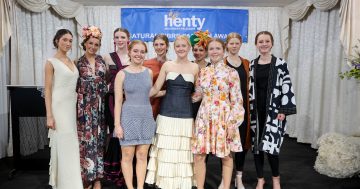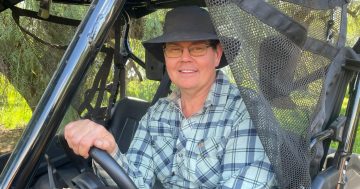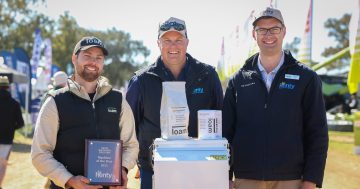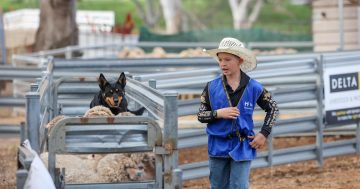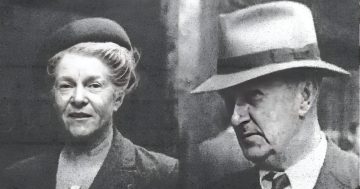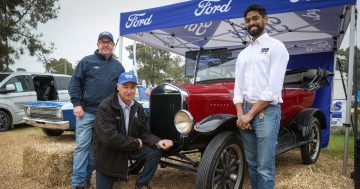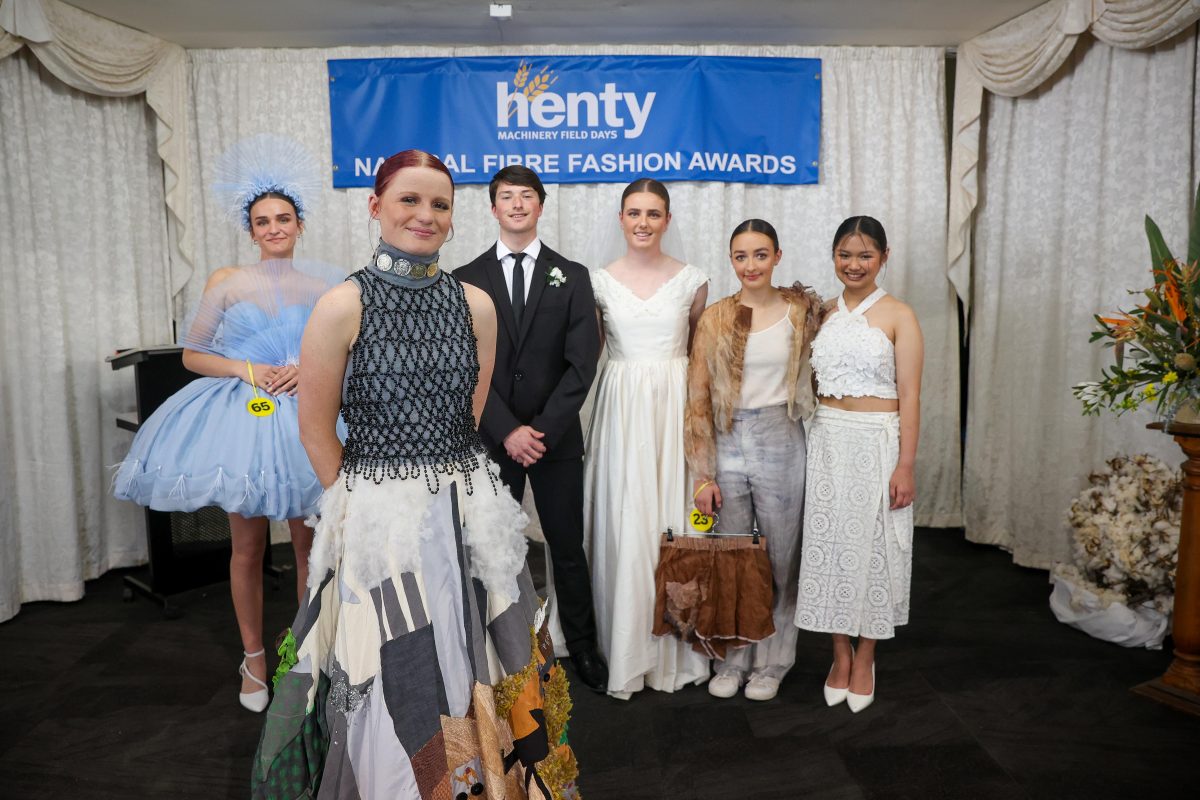
The line-up for the Supreme Garment award at the Henty Machinery Field Days, which was won by Wagga designer Caitlin Cumberlege, and modelled here by Leila Anaschaw. Photo: Andy Rogers.
Could you picture yourself wearing a jacket made from bacteria grown in a laboratory? Or daring to wear your political beliefs quite literally on your sleeve?
Welcome to fashion of the future, being led by talented young designers such as Wagga’s Caitlin Cumberlege, who are weaving together new worlds of wearable art and futuristic fibres.
The 18-year-old stole the limelight at the 2025 Henty Natural Fibre Fashion Awards, taking out the Supreme Garment title during the three-day Henty Machinery Field Days, 23-25 September.
Caitlin wowed the judges with a dress that made a statement about global environmental degradation, with the skirt and bodice made from recycled fibres and textiles with embellished embroidery and applique techniques.
The creation was Caitlin’s major work for her HSC and she is now studying sustainable textile innovation, new fibres and systems at RMIT, Melbourne.
She said the win at Henty was “very affirming for me”.
“I wanted to end up with a garment that was beautiful but also meant something to me,” she said. “The first time I went to gather materials for the dress I went to an op shop and rifled through whatever was on sale to find the right textures and colours.”
But however much she enjoys the design aspects of fashion, Caitlin says she is more interested in designing materials, “especially biodesign such as growing things in labs”.
“There was a jacket made of scoby (symbiotic culture of bacteria and yeast dried to a leather-like consistency) as part of the competition and I find that sort of thing exciting,” she said.
“There are a lot of people working with it and we’ve grown a scoby culture as part of this semester’s unit. Our course looks at sustainability in a holistic way – you can go down the theoretical path such as managing sustainability systems, or take a hands-on approach creating fabrics and fibres.”
And while she points out there’s “no silver bullet with sustainable solutions … and just because you’re growing it in a lab doesn’t mean it’s the best option”, Caitlin believes there’s a lot to be gained in creating materials using a lot fewer resources.
“I love biodesign as a subject because you can combine the scientific and the creative,” she said.
Caitlin was introduced to Henty’s natural fibre awards through modelling the entries with The Riverina Anglican College, Wagga.
“I got involved with my textile class and I loved being there and seeing all the amazing materials people could come up with,” she said, adding she was fascinated with textures and fabrics from a very young age.
From early forays into knitting and weaving, her interest grew into something far bigger when she got to Year 11 and needed to think about what she wanted to do when school finished.
In biodesign, she has found the “perfect” course to study. “It’s the thing I could never get bored with,” she said.
A first-time entrant at Henty, Caitlin also won the award for Best Garment Made by a Student for the dress modelled by Billabong High School Year 10 student Leila Anaschaw.
The 20th Henty Natural Fibre Fashion Awards were a highlight of the Country Lifestyle program, drawing 726 entries and accessories from almost every state and internationally, including 33 entries in the new Recycled and Repurposed category.
Designers were inspired to use velvet curtains, tablecloths, tea towels, blankets, crocheted doilies, old shirts, cotton towels, vintage fabrics and cotton quilts to present an eclectic range of overalls, coats, dresses and men’s clothing.
This year’s judges for the awards included Wagga’s Colleen Langtree, Grenfell’s Lisa Schaefer and Culcairn’s Diane Clancy.
Wagga was well represented in the winner’s circle with Robyn Taylor claiming the best accessory award with a bright backpack made from leftover cotton fabrics, and Rebecca Hillas taking out the millinery award with her bright yellow and orange headpiece.
Judy Bond, from Coomealla, was a return winner – her cream cocktail dress and matching hat hand crocheted in pure wool claimed the Knitted and Crocheted award – while Jan Dew, of Henty, used a lace tablecloth to make a skirt and crop top embellished with pearl beading to win the Best Repurposed and Recycled category.







